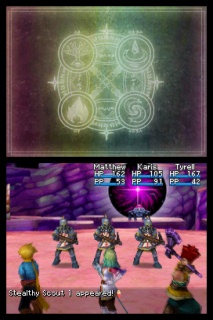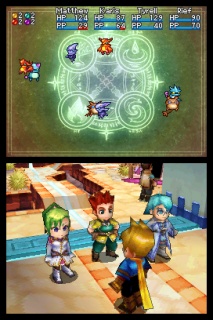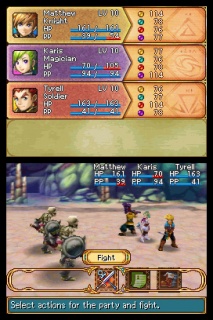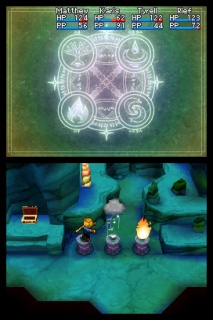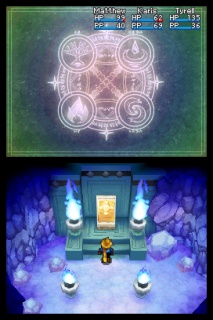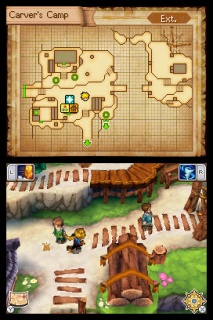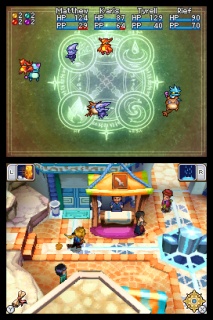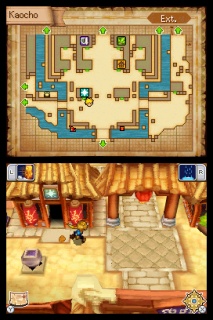Golden Sun: Dark Dawn
| Golden Sun: Dark Dawn | |
|---|---|
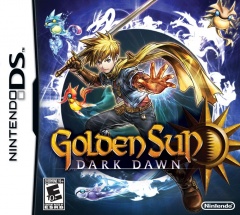 |
|
| Platforms | DS |
| Genre | JRPG |
| Score | 8  |
| Buy from Amazon | |
The Nintendo DS is easily the go-to console this generation when it comes to RPGs. As a developer, you'd be hard-pressed to have your title stand out in a library already rife with role-playing goodness. There are exceptions however, and Camelot's Golden Sun franchise is certainly one of them. The series' notoriety on the Game Boy Advance was enough to perk people's ears when Golden Sun: Dark Dawn was first announced. The sequel comes to us 7 years after the The Lost Age, with 30 years having passed in the game's universe. The original GBA games were hits. Does the sequel live up to the legacy they left behind?
If you take a glance at the beginning of my First Hour review, you'll see that I've listed what, I feel, makes a damn good Golden Sun game. I thought I'd keep this review simple and basically go through each of the points I already made and comment on what's changed and whats been added or subtracted from the core experience.
The tale of Dark Dawn, while not as grand as those of the first two titles', is nonetheless a worthy addition to the Golden Sun canon. It suffers from some odd pacing, but the story's biggest problem actually comes from its dialog. Now don't get me wrong, I'm not opposed to text-heavy games—certainly not RPGs—so long as what I'm reading is informative and entertaining. Dark Dawn's text certainly has those traits, but it's dialog suffers from excessive amounts of pointless banter. Every character says something in every conversation; things that don't contribute anything at all. And by the time you get a full party of eight (plus those tagging along), this can get pretty ridiculous.
At least Matthew—much like his father in the first game—is a mute. Unfortunately, people often talk for him, which is even more annoying. I'm not saying that every conversation needs to advance the story in some way, but oftentimes you'll find yourself telling the cast to shut up and get to the point. When they get there, you'll often have to suffer through it several times. There's a lot of reiteration when it comes to important story elements—as if Camelot thought we'd be too stupid to remember.
Still, if you loved the story of the first two games, you'll probably enjoy this one as well. And without spoiling too much, by the end of the game, it's evident that Dark Dawn—in true Golden Sun fashion—was just a prologue for the real quest yet to come. If I were to make a rather obvious guess, I'd say we can expect to see the story continue on the Nintendo 3DS at some point.
Before I move on, I'll mention that the choices your given during conversations (I touched on this in the First Hour review) don't impact the story at all outside of prompting a different response, so don't worry about the consequences of your choices—there are none.
The battle system remains virtually unchanged, which is a very good thing (if it ain't broke, don't fix it). Psynergy, Djinn, and summons work in the exact same way. All of them make a return in fact, with a few new additions. You might think it "lazy" of Camelot not to have added much after seven years, but if Square Enix's Final Fantasy can get away with it, so can Golden Sun. This goes back to the "if it ain't broke, don't fix it" line, and I personally loved seeing all of my favourite spells and summons return anew in 3D. They didn't just receive graphical updates, by the way—most have undergone significant changes to their design and animation. One of my favourite updates is to Tiamat. In the original games, summoning Tiamat would call forth a chubby baby dragon to scorch foes with a breath of fire. Well, that was 30 years ago (story wise), and let's just say, she's grown up.
The biggest change to combat is how Artifact weapons and their special attacks work. In the original games, every weapon has a critical hit, while Artifacts have a special attack in addition. In Dark Dawn, there are no critical hits per se—instead, every weapon has at least one special (though oftentimes it's simply a "Critical Strike"), while Artifacts have up to four. But no matter the weapon, characters won't be able to unleash its special attacks until they've mastered the weapon a certain degree. The character's mastery of a specific weapon is indicated by a Weapon Skill Meter on the item's page. It fills as players hit enemies with standard attacks, and the fuller it gets the more specials they'll have access to. Filling the bar completely masters the weapon, at which point specials will occur more often. Most weapons have pretty cool specials—some can even summon creatures. Much like Psynergy, Djinn, and summons, a lot of old favourites make a return in Dark Dawn. The ability to forge Artifacts returns as well.
The game's difficultly in this department is rather disappointing however. Boss fights are few and far between, and aren't very challenging at all save for the final boss and those you face in the end-game. This means that the player is never really pushed to explore the depths of Golden Sun's brilliant battle system during the main story, which is a shame. Fighting is still fun as hell though, but I really hope Camelot takes off the kiddie gloves next time around.
As any Golden Sun fan will tell you though, dungeon crawling is the other half of the experience. Dark Dawn's puzzles aren't some of the most difficult we've seen, but are among the most creative and fun. The game is now home to some favorites of mine for sure.
One of the things that can dampen the challenge for players, however, is a particular ability acquired relatively early in the game called Insight. It's a spell whose power reveals what Psynergy can be used and where by showing that Psynergy's symbol over the intractable objects in view (even if its effect won't produce any real results; it does this for every pillar, puddle, flame, etc.). Remember those times when you saw something you knew could be manipulated but just didn't know exactly what Psynergy to use? This saves you the trouble of going through your entire bag of tricks before discovering you in fact don't have it. It's great for saving time and possibly frustration, but you'll still have to remember what symbol was shown less you haul your ass all the way back to discover you still don't have the right spell.
That's what's good about it, in my opinion, but I fear that its abilities may have been taken too far. I say "may" because I don't actually know. I refrained from using it in certain situations for fear that it would reveal the solutions to puzzles I was solving, after accidentally using it in one such situation. It more or less revealed the solution (I won't say where or how), which was a real disappointment having not solved it on my own just yet.
For this reason, Insight seems to have been added to increase the game's "accessibility"—in other words, broaden the games appeal to a wider audience. There are other such additions that also do just that by helping players keep track of their progress (in many areas), though most of them are welcome additions for the most part.
The Encyclopedia is a very smart inclusion by Camelot. It lists detailed information on important people, places, and terms in the Golden Sun universe, providing those new to the series, as well as those who haven't touched it in quite some time, a means of keeping up with the story. And of course, it also provides juicy bits of game lore for those interested (like me). An interesting thing about the Encyclopedia is that it updates as you go, so if you notice a highlighted term you could've sworn you've already entered, it's because it's a new description. Before moving on, I'll take this opportunity to say I'm slightly disappointed in Camelot for not including a Bestiary section while they were at it. I don't know, I personally love those things; it's like playing Pokémon if the phrase were "Gotta kill 'em all!"
The Sun Saga tomes fill the gaps between Encyclopedia entries, giving a quick overview of what happened during the course of the first two games. Each chapter is presented in a delightful, storybook-like animation with nursery rhyme-ish music playing in the background. There are five chapters to find in total. You're not a hardcore Golden Sun fan unless you watch every second of every one (*glares*).
The Atlas is a great resource for keeping track of where the hell everything is. It basically saves the small maps you'll find on the top screen while traversing towns and dungeons and categorizes them by location. If you spot a treasure chest or Djinni, it will mark those as well, and whether or not you grabbed them. This makes backtracking for missed chests or Djinn (which you may have left because you lacked the appropriate Psynergy to acquire them) much, much easier. You'll still need to remember the general area though, if you don't want to sift through pages upon pages of cartography.
The Djinn Guide is like a second Encyclopedia specifically for Djinn. Each entry gives a brief description of the Djinni's name, it's effect, and where you found it. This, combined with the Atlas, makes tracking down every Djinn in the game much less of a task, and normally I'd condemn its inclusion because of that...were it not for the fact that it is possible to permanently miss a significant amount of Djinn during your quest.
Finally, the Travel Log is a great little addition. It's essentially the 'Save Game' screen, but includes a small yet important paragraph above your files, which is a summation of your party's current objective. Obviously, this is useful for picking up where you left off a day or two (or ten) ago, but it also helps while you're playing. Now you need not remember every minor detail of those important, often (overly) long conversations just to ensure you've remembered the critical points.
Again, it's obvious that most of these tools were added to increase accessibility among lesser RPG players in and attempt to perhaps broaded the fanbase. Unfortunately, Dark Dawn's overall difficulty suffers as a result, which will be a huge disappointment to a lot of fans.
Ultimately though, despite all of the shortcomings, I can't deny that I had an absoulte blast playing Dark Dawn. None of its faults stop it from being a fantastic RPG, and just a fantastic game overall. And they certainly didn't stop this Golden Sun fan from enjoying every second of this 40+ hour experience (if you want to find everything). Here's looking forward to the next great chapter in the Golden Sun saga, and here's hoping the wait won't be as long.
Overall: 8

